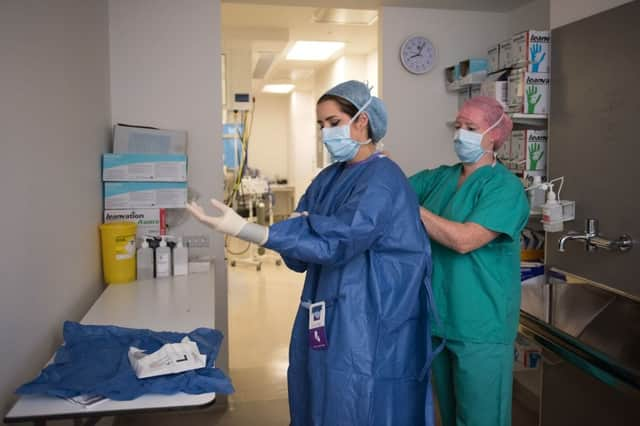Surgeons call for specialist hubs to tackle ‘colossal’ surgery backlog and cut waiting times


Surgeons are calling for specialist surgical hubs to be set up in England to tackle the “colossal backlog” of non-urgent procedures.
The Royal College of Surgeons (RCS) said the hubs should be developed to allow planned surgery to take place in every region of the country in the event of another Covid-19 outbreak, or other severe pressures caused by flu.
Advertisement
Hide AdAdvertisement
Hide AdSurgery must be available ‘all year round’
The RCS has urged the Government to spend an extra £1 billion on surgery annually over the next five years as part of plans to improve surgical services.
The Royal College has made 12 recommendations of both long and short term measures which could improve the sustainability of services in the future.
Elective surgery, which includes hip and knee replacements, were cancelled during the early stages of the Covid-19 pandemic.
The cancellations meant that 4.95 million were still waiting to start NHS hospital treatment at the end of March, which is the highest figure since records began in August 2007.
Advertisement
Hide AdAdvertisement
Hide AdNHS figures show that more than 436,000 were waiting for treatment for more than a year, compared with just 1,600 before the coronavirus crisis.
A similar proportion of the population is also on waiting lists in Scotland and a higher percentage in Wales and Northern Ireland.
Professor Neil Mortensen, president of the RCS, said: “We need Government support for a New Deal for Surgery to reduce the colossal backlog in elective surgery and to help the NHS weather future pandemics.
“Surgery must be available on the NHS all year round, not stop and start.
Advertisement
Hide AdAdvertisement
Hide Ad“If a dangerous new variant of Covid-19 takes hold, or another bad flu arrives in the autumn, we cannot allow surgery to grind to a halt again or waiting lists will become insurmountable.”
42 hubs could be rolled out across England
The proposed hubs would be in every Integrated Care System, of which there are 42 in England.
The idea is that the hubs would help to reduce the risk of infections spreading from other parts of hospitals, while bringing specialist teams together into one dedicated place should improve efficiency, helping to cut down waiting times.
Prof Mortensen said non-emergency surgical hubs could be created by splitting up hospitals into urgent and non-urgent care, and noted that surgical hubs for orthopaedics and cancer treatment already operate in some areas.
Advertisement
Hide AdAdvertisement
Hide AdHe told BBC Radio 4’s Today programme: “A recent poll we commissioned showed that the overwhelming majority of patients are content with having to travel to a surgical hub if it means they get their surgery done in a timely and particularly a safe way.
“Some sort of separate facilities, which allows untrammelled, efficient, smooth throughput surgery is absolutely essential.”
The Department of Health and Social Care (DHSC) has said it is providing an extra £7 billion for health and care services this year, along with additional funds to address the significant backlogs that built up over the course of the pandemic.
A DHSC spokesperson said: “We have backed the NHS at every point in the pandemic, safeguarding urgent treatment such as cancer and emergency care, while protecting the NHS to ensure it was not overwhelmed.
Advertisement
Hide AdAdvertisement
Hide Ad“We are providing an extra £7 billion for health and care services this year, as well as £1 billion to tackle the backlogs that have built up, bringing our total additional Covid-19 investment to £92 billion.
“We face an unprecedented challenge and will continue to work closely with the NHS to accelerate the recovery of services so everyone gets the care they need, including £160 million to support hospitals to find innovative ways to carry out even more operations and cut waiting lists.”